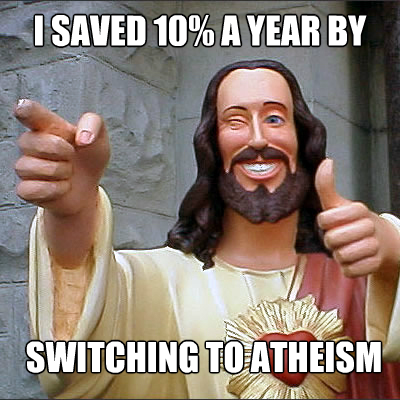“The Great and Dreadful Day of the Lord”
Zechariah 10–14; Malachi
LDS manual: here
Reading
Hey, we’re to the last Old Testament lesson. This is Lesson 48, which is so far down the list that I doubt many wards will even get to it — the manuals for other years have only 46 lessons — but it’s got some material on tithing, and we can hardly expect the church to skip over that, can we? There’s also some end-of-the-world stuff. So let’s get to it!
To start off, let’s review God’s actions in the OT.
- Early period: He creates the world and all of humanity, giving them nonsensical and contradictory commandment he knows they won’t be able to obey. He punishes them with death by drowning. He occasionally tries to kill his prophets or their children. Encourages the murder of gay people
- Post-exodus period: Instead of proclaiming peace, he encourages his people to commit genocide against their neighbours, and eliminates their religions in an attempt to wipe out competition through violence.
- The Diaspora: Threaten his people with death for being insufficiently religious, and eventually allows their capture and enslavement.
- Future apocalypse: Threatens to kill the whole world eventually.
In other words, Jehovah (soon to become Jesus) has acted like a tyrant and a bully throughout the entire OT. Looking back, it’s hard to believe that I could read the Bible and still worship this violent deity. How could I have read about his failure to rescue his own people from conquest, and thought, “Now here’s a guy I want on my side”?
There’s really only two ways about it: either God is an unimaginably evil psychopath — in which case, I want nothing to do with him — or he doesn’t exist. I find this latter probability to be much more plausible. The god of the Bible is the product of human imagination, as people tried to find explanations for the world around them and all the horrible things that happened to them. The alternative that believers choose — that God is real and responsible for all the horror and carnage in the Bible — is ironically more disrespectful to their god.
Anyway, we’re now up to the minor prophets Zechariah and Malachi. By this point, God was getting so frustrated with his priests that he had to resort to increasingly desperate threats against them, like threatening to smear animal dung on their faces. (They never read this one in Sunday School.)
Mal. 2:3 Behold, I will corrupt your seed, and spread dung upon your faces, even the dung of your solemn feasts; and one shall take you away with it.
When those threats don’t work, God will lapse into a stony silence for 400 years.
Zechariah, for his part, threatens everyone who fights against Israel thusly:
Zech. 14:12 And this shall be the plague wherewith the LORD will smite all the people that have fought against Jerusalem; Their flesh shall consume away while they stand upon their feet, and their eyes shall consume away in their holes, and their tongue shall consume away in their mouth.
No doubt the inspiration for that scene from Raiders of the Lost Ark.
Eventually, there won’t be any more non-Jews in the temple.
Zech. 14:21 Yea, every pot in Jerusalem and in Judah shall be holiness unto the LORD of hosts: and all they that sacrifice shall come and take of them, and seethe therein: and in that day there shall be no more the Canaanite in the house of the LORD of hosts.
Keeping non-Jews out of the temple? They may have to rethink that eventually.
Main points for this lesson
Robbing God: It’s about the priests
This lesson contains a very well-known scripture about tithing (the meaning of which has changed over the years).
Mal. 3:8 Will a man rob God? Yet ye have robbed me. But ye say, Wherein have we robbed thee? In tithes and offerings.
3:9 Ye are cursed with a curse: for ye have robbed me, even this whole nation.
3:10 Bring ye all the tithes into the storehouse, that there may be meat in mine house, and prove me now herewith, saith the LORD of hosts, if I will not open you the windows of heaven, and pour you out a blessing, that there shall not be room enough to receive it.
What’s not always mentioned is that this scripture is to the priests, not the membership. God (or Malachi) is pissed off because the priests have been fobbing off the blind, lame, and otherwise imperfect animals onto the Levites.
The LDS Church has taken this scripture out of context, and is using it to guilt the members into fuelling its well-moneyed empire. How well-moneyed? A recent estimate from Reuters and University of Tampa sociologist Ryan Cragun pegs it at $7 billion annually.
Relying heavily on church records in countries that require far more disclosure than the United States, Cragun and Reuters estimate that the Church of Jesus Christ of Latter-day Saints brings in some $7 billion annually in tithes and other donations.
It owns about $35 billion worth of temples and meeting houses around the world, and controls farms, ranches, shopping malls and other commercial ventures worth many billions more.
This Bloomberg Businessweek article has more. Remember, this is all tax-free, which means the rest of us have to foot the tax bill for religions, even if we don’t believe in them, or want to support them. Meanwhile, they’re rolling in the dough, and paying a pittance in humanitarian aid — about a billion dollars since 1985 by its own reckoning, or about $5 per member per year.
The Church of Jesus Christ of Latter-day Saints has donated more than $1 billion in cash and material assistance to 167 different countries in need of humanitarian aid since it started keeping track in 1985.
In the words of a modern prophet: Let’s go shopping!
The LDS Church tells its members to pay tithing rather than meet their financial obligations in the mistaken belief that a god will make everything okay.
After reading these scriptures together, Bishop Orellana looked at the new convert and said, “If paying tithing means that you can’t pay for water or electricity, pay tithing. If paying tithing means that you can’t pay your rent, pay tithing. Even if paying tithing means that you don’t have enough money to feed your family, pay tithing. The Lord will not abandon you.”
And, of course, not paying up means you don’t have access to the temple, which means you might lose your salvation and your eternal family. It’s made out to be voluntary, but it’s really coercive.
It’s easy to see what matters most to the men in Salt Lake. It’s why Latter-day Saints have a special meeting — Tithing Settlement — at the end of the year, just to make sure everyone’s paid up.
Leaders of the church feign concern that God is being robbed, but they’re the ones making out like bandits — and remember, they’re the one selling the fake merchandise, an eternity of pie in the sky when you die. The ones who are really being robbed are the membership, the rest of us who are paying their taxes, and in a sense, people all over the world who are going without because people are donating to their church, instead of to a secular charity.
Hey, this lesson happens around Christmas. Have you donated to a secular charity? Me, I dumped my WorldVision kid and started pumping out money to Oxfam, MSF, the Smith Family, and some other good orgs. Much better than — say — the Salvation Navy.
Tithing and the sunk cost fallacy
Why would a supreme being need money anyway? George Carlin gets it right in this comedy routine.
The typical Mormon response is that “tithing isn’t for the Lord, it’s for you” or it “builds faith”. Well, tithing does keep people believing, but this is because of the sunk cost fallacy. When someone has started giving money to a church, it then becomes harder to think that the church is not true, because doing so would be tantamount to admitting that paying tithing was money down the drain. For many, this is too painful to admit, so they keep paying, and good money follows bad. Tithing is intended to keep you in.
Joseph Smith knew that commitment was the way to hold people.
“Let us here observe, that a religion that does not require the sacrifice of all things, never has power sufficient to produce the faith necessary unto life and salvation.”
So stop paying tithing. You’ll be saving money, and if Joseph Smith is involved, possibly a daughter.
Additional lesson ideas
Apple of his eye
Here’s a King James phrase that has stuck with us.
Zech. 2:8 For thus saith the LORD of hosts; After the glory hath he sent me unto the nations which spoiled you: for he that toucheth you toucheth the apple of his eye.
It appears that here in Zechariah, the word ‘bava’ might really mean ‘apple’, as a reference to the pupil.
Our word ‘pupil‘ comes from Latin pupilla or ‘little doll’, because when you look into someone’s eye, you see your own tiny image, and people thought that looked like a doll. Other instances of eye-apples in the Bible are probably closer to this sense of ‘little man’.
Thanks for reading with me through the lessons this year! I hope you’ve enjoyed them, and I’ll see you next year as we start the New Testament.


Recent Comments